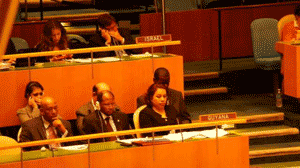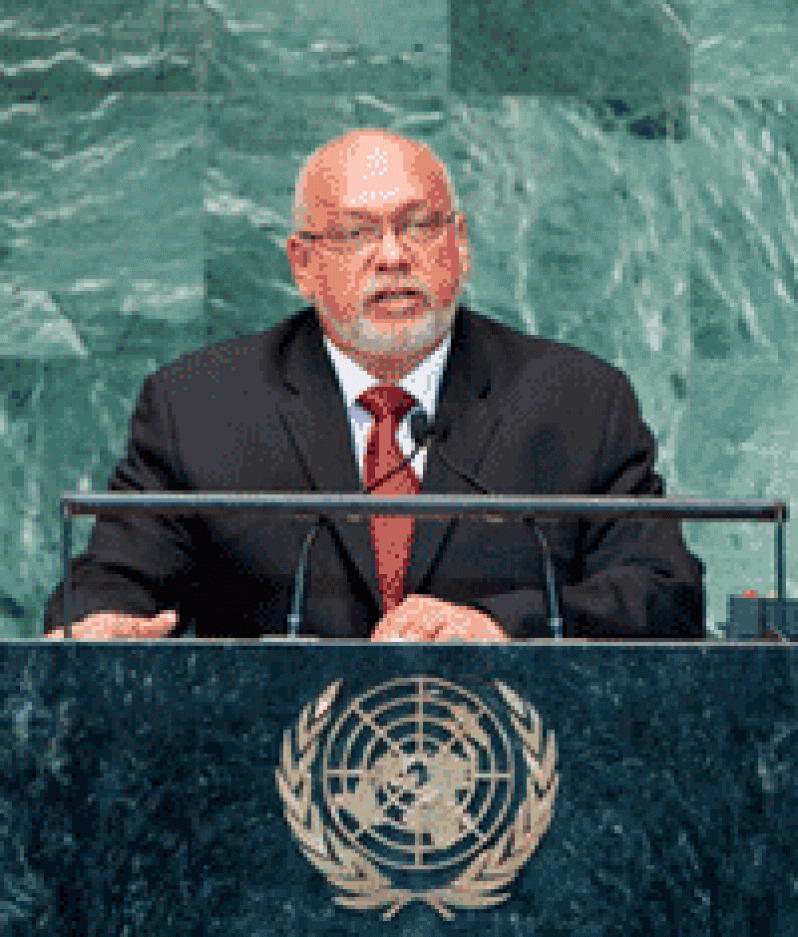PRESIDENT Donald Ramotar has expressed concern about weaknesses in the international economy and the impact they are likely to have on sustained growth in developing countries if prolonged, even as he shared success stories in Guyana at the 67th United Nations General Assembly in New York today.
 President Ramotar, speaking to world leaders, said cognizance of these challenges make the case more compelling for reform of the graduation policies and aid allocation criteria of the International Financial Institutions, measures to ease the debt burden, renewed access to concessionary financing for highly indebted middle income countries, and strengthening financial regulations.
President Ramotar, speaking to world leaders, said cognizance of these challenges make the case more compelling for reform of the graduation policies and aid allocation criteria of the International Financial Institutions, measures to ease the debt burden, renewed access to concessionary financing for highly indebted middle income countries, and strengthening financial regulations.
“Several of the major contributors to global output are grappling with unsustainable fiscal balances which hinder their ability to stimulate lasting recovery. The problems in these economies continue to place a drag on global growth. Compounding these difficulties is the slowdown in output in major emerging economies. Naturally, these events have had serious negative impacts on developing countries,” the Guyanese leader said.
“Although more resilient than in earlier times, developing countries have paid a heavy price as a result of the present difficulties  experienced in the world economy… Much of the gains that were made in the pre – 2008 period have been erased by the continuing difficulties in the world economy. The small vulnerable economies of the Caribbean face special challenges, compounded by generally high levels of indebtedness and falling export revenues.”
experienced in the world economy… Much of the gains that were made in the pre – 2008 period have been erased by the continuing difficulties in the world economy. The small vulnerable economies of the Caribbean face special challenges, compounded by generally high levels of indebtedness and falling export revenues.”
President Ramotar made reference to Guyana maintaining stability at the time of the global recession and achieving an economic growth rate of approximately five percent per annum over the past six years.
Guyana’s economy recorded a 2.8% growth in real Gross Domestic Product, according to the 2012 midyear report, with total export earnings growing by 9.2%, gold by 13.2% and bauxite by 41.9%. Interest rates trended downwards and inflation remained within acceptable norms at 1.8%, while Private Sector Credit expanded by 8% and Foreign Direct Investments amounted to US$167.2M in the first half of 2012.
Guyana was considered a country with bright growth prospect while other nations in the Caribbean Community were hindered by the economic downturn.
President Ramotar believes it was as a result of the investments his government made in people, dedicating more than 30 percent of the country’s budget to education, health, housing, water and social programmes targeting the most vulnerable.
The goal for universal primary education has been achieved and attaining same at the secondary level is within reach; however, significant challenges remain in reaching people in the remote areas. “If we are to encourage our youth to become responsible citizens and prepare them to be the leaders of tomorrow, we must ensure that our education systems allow for the development of their full potential,” he urged.
The country is set to experience a new wave of development under the country’s Low Carbon Development Strategy (LCDS).
However, with the international economic crisis posing a threat to sustainability of growth in the country and that of other developing countries, President Ramotar warned of negative social problems in its wake.
In July, the United Nations Programme on HIV/AIDS (UNAIDS) Director of Caribbean Regional Support Team, Ernest Messiah, met President Ramotar with concerns about donor funding to programmes targeting the deadly disease being curtailed because of the impact of the global financial crisis on a number of donor countries that have had to turn to austerity to salvage their economies from the downturn.
In yesterday’s address, President Ramotar made reference to the fight against narco-trafficking being affected, particularly as it relates to the availability of guns in many societies, most of which are by-product of the narco-trade.
Concerns were also expressed about the global response to the climate crisis which has still not met expectations in scale and urgency as the promise of fast-start financing has not materialized, and as a low-lying coastal state, Guyana is mindful of the dangers posed by climate change.




.jpg)









